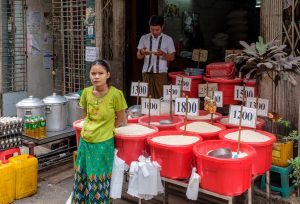The United States Trade Representative (USTR) has announced the suspension of all U.S. engagement with Myanmar under a trade and investment agreement signed between the two countries, in response to the escalating violence in the country.
In a statement yesterday,Trade Representative Katherine Tai said the suspension, effective immediately, was taken in response to last month’s military coup and the subsequent violent crackdown on civilians.
“The United States supports the people of Burma in their efforts to restore a democratically elected government, which has been the foundation of Burma’s economic growth and reform,” Tai said in the statement.
“The killing of peaceful protestors, students, workers, labor leaders, medics, and children has shocked the conscience of the international community. These actions are a direct assault on the country’s transition to democracy and the efforts of the Burmese people to achieve a peaceful and prosperous future.”
The USTR will suspend the Trade and Investment Framework Agreement (TIFA), which was signed between Myanmar and the U.S. in 2013, in order to avoid conferring any official recognition or legitimacy on the coup regime, which refers to itself as the State Administration Council (SAC). The USTR will cease engagement with the SAC ministries and representatives on any bilateral trade issues and that dialogue will only resume after the democratically elected government of Myanmar has been restored.
In addition to suspending future TIFA engagements with the military regime, USTR is also set to reassess Myanmar’s eligibility for the Generalized System of Preferences (GSP) program, which grants it tariff-free access to the U.S. market for certain goods. Washington previously suspended Burma’s GSP benefits in 1989, following the violent suppression of pro-democracy demonstrations and strikes in 1988. Myanmar is currently the U.S.’s 84th largest goods trading partner, with $1.4 billion in two-way goods trade in 2020.
The U.S. move came in response to continued violence across the country, following the killing of at least 114 people on March 27, the bloodiest day in the protests so far. Security forces have killed at least 510 civilians in the two months since the military’s seizure of power on February 1. Despite the violence, the protests show no sign of abating.
Meanwhile, Thailand is witnessing the first of what could well be many waves of civilians fleeing across the border. The Karen National Union (KNU) confirmed Monday that around 10,000 residents fled to a safe zone last weekend after the Myanmar military conducted air strikes on KNU-controlled territory in eastern Myanmar, killing three people.
The airstrikes followed an attack by Karen rebels on a military base, in which 10 soldiers were killed and another eight were arrested. The KNU also claims that Thai soldiers soon began sending back some of the thousands of people who have crossed the border, despite Prime Minister Prayut Chan-o-cha making an unconvincing promise that Thailand would respect the human rights of refugees.
The continued violence at both center and periphery continues to generate calls for outside powers to respond more forcefully to the military regime.
In addition to the USTR’s office, the U.S. Commerce Department has imposed trade restrictions on junta-linked businesses, while the Treasury Department has imposed sanctions on leading military and police commanders, two infantry divisions involved in violent crackdowns, and two large conglomerates connected to the military, along with the U.K. government. Other Western countries including Canada and the European Union have also imposed targeted sanctions and travel bans on leading regime figures.
The U.K. government called for a closed meeting of the U.N. Security Council which will be held Wednesday afternoon, while U.N. Secretary General Antonio Guterres called the bloodshed of March 27 “absolutely horrendous,” and urged greater unity and commitment by the world to induce the Myanmar armed forces to reverse course and go back to “a serious democratic transition.”
“My message to the military is very simple: Stop the killing. Stop the repression of the demonstrations. Release the political prisoners, and return power to those that have really the right to exercise it,” he told reporters at U.N. headquarters in New York.
A string of further measures is likely to come, but given that the sanctions imposed so far appear not to have nudged the military off its chosen path, their ultimate effect remains uncertain. In his comments yesterday, Guterres said he was worried that the situation may be irreversible, but expressed hope that a solution could be found, adding, “hope is the last thing we can give up on.”
































